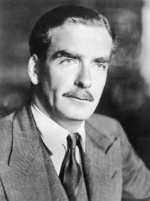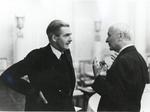Anthony Eden
| Surname | Eden |
| Given Name | Anthony |
| Born | 12 Jun 1897 |
| Died | 14 Jan 1977 |
| Country | United Kingdom |
| Category | Government |
| Gender | Male |
Contributor: C. Peter Chen
ww2dbaseRobert Anthony Eden was born to Sir William Eden at Windlestone Hall, Bishop Auckland, Durham. He was educated at Eton and Christ Church, Oxford, but was rejected by Sandhurst due to his poor eyesight. He studied foreign languages and had various skill levels in French, German, Russian, Persian, and Arabic. Nevertheless, as WW1 broke out in Europe, he was able to become commissioned in the King's Royal Rifle Corps, with which unit he served in France and was awarded the Military Cross at the Battle of the Somme. At the end of the war, he reached the rank of major. During the war, he lost his younger brother Nicholas at the Battle of Jutland.
ww2dbaseAfter the war Eden entered politics as a Member of Parliament for Warwick and Leamington for the Conservative Party in 1923. Between 1926 and 1929 he was the parliamentary private secretary to Austin Chamberlain at the Foreign Office. In 1931, he became the Under Secretary for Foreign Affairs and held that post until 1934. In 1935, he became Prime Minister Stanley Baldwin's Foreign Secretary, but resigned in 1938 when he strongly disagreed with Neville Chamberlain and Samuel Hoarse's appeasement of Italy after the Italian invasion of Abyssinia (although he did not oppose similar measures with Germany). In 1940, he was first appointed Secretary of State for War then reappointed Foreign Secretary under the new Prime Minister Winston Churchill. Churchill treated him as one of his closest confidants and lieutenants, but took away much of Eden's responsibilities as Foreign Secretary when the Prime Minister himself attended most of the high profile meetings with other heads of state during the war. In 1942, he also took on the task as the Leader of the House of Commons.
ww2dbaseAfter the war, Eden served another term as Foreign Secretary in 1951. In the same year, when a British-controlled oil company was nationalized by the government in Iran, he approved of an undercover mission by MI6 to overthrow the Iranian leader Mohammed Mussadeq; the mission was rather successful in organizing resistance to Mussadeq, and in 1953 the Shah of Iran assumed power in Iran with British backing. In Apr 1955, Eden succeeded Churchill as the prime minister. In 1954 he was made a Knight of the Garter. In 1956, subsequent to Egypt nationalizing the British and French-owned Suez Canal, Britain, France, and Israel attacked Egypt upon failing negotiations. Britain and France were fearful that the nationalization of the Suez Canal was a sign of a future oil boycott on Western Europe. On 29 Oct 1956 Israeli Army marched across the border with Egypt, followed by a British and French aerial bombardment and naval landing in early Nov. Under UN pressure, the invaders withdrew on 7 Nov. However, diplomatic damage was already done, and as Britain and France feared the Arab nations reduced oil experts to Western Europe, resulting in oil rationing.
ww2dbaseEden resigned on 9 Jan 1957 for health problems he had suffered since the early 1950s in addition to the loss of public confidence after the Suez fiasco. He was made Earl of Avon in 1961, and published his memoirs in 3 volumes between 1960 and 1965. He also wrote Another World in 1976 regarding his experiences in WW2.
ww2dbaseEden passed away in Salisbury in 1977.
ww2dbaseIn a 2004 poll of 139 political science academics, Eden was voted the least successful British Prime Minister of the 20th Century.
ww2dbaseSources: Spartacus Educational, Wikipedia.
Last Major Revision: Dec 2005
Anthony Eden Interactive Map
Photographs
 |  |  |  |
Anthony Eden Timeline
| 12 Jun 1897 | Anthony Eden was born. |
| 10 Nov 1939 | British Secretary of State for Dominion Affairs Anthony Eden met with French Prime Minister Édouard Daladier and Commander-in-Chief General Maurice Gamelin in Paris, France, joined by representatives from Australia, New Zealand, South Africa, and India. |
| 12 Feb 1940 | Anthony Eden, Secretary of State for Dominion Affairs of the United Kingdom, welcomed the first Australian and New Zealand troops to arrive in Suez, Egypt. |
| 11 May 1940 | British Prime Minister Winston Churchill appointed Anthony Eden as Secretary of State for War. |
| 23 Dec 1940 | Anthony Eden was appointed Foreign Secretary of the United Kingdom. |
| 5 Jul 1941 | British Foreign Secretary Anthony Eden officially ruled out any chance of negotiations with Germany. |
| 6 Aug 1941 | British Foreign Minister Anthony Eden issued another warning to Japan stating that any action against the independence of Thailand would be regarded as a threat to imperial security. |
| 17 Dec 1942 | Foreign Secretary Anthony Eden reported to the British House of Commons of the mass murder of Jews by the Germans; this would be followed almost immediately by a US declaration that these crimes would be avenged. |
| 21 Feb 1943 | The Red Army's 25th anniversary was celebrated in London, England, United Kingdom with a massed gathering at the Albert Hall. Foreign Secretary Anthony Eden represented the government while other notable celebraties present included Dame Sybil Thorndike and Commander Ralph Richardson RNVR. |
| 1 Jun 1943 | Anthony Eden announced that British casualties in first three years of war were 92,089 killed, 226,719 missing, 88,294 wounded, and 107,891 captured. |
| 8 Apr 1944 | British Secretary of State for Foreign Affairs Anthony Eden issued a statement condemning German atrocities and called for those responsible to be brought to justice. |
| 14 Aug 1944 | Winston Churchill ordered Anthony Eden to against request assistance from Joseph Stalin for the resistance fighters in Warsaw, Poland. |
| 14 Jan 1977 | Anthony Eden passed away. |
Did you enjoy this article or find this article helpful? If so, please consider supporting us on Patreon. Even $1 per month will go a long way! Thank you. Share this article with your friends: Stay updated with WW2DB: |
Visitor Submitted Comments
All visitor submitted comments are opinions of those making the submissions and do not reflect views of WW2DB.
» Quadrant Conference
» Third Moscow Conference
» Fourth Moscow Conference
» Malta Conference
Related Books:
» Ministers at War: Winston Churchill and His War Cabinet
- » 1,150 biographies
- » 337 events
- » 43,917 timeline entries
- » 1,241 ships
- » 350 aircraft models
- » 207 vehicle models
- » 374 weapon models
- » 123 historical documents
- » 260 facilities
- » 470 book reviews
- » 28,544 photos
- » 432 maps
Lt. Gen. Lewis B. "Chesty" Puller, at Guadalcanal
Please consider supporting us on Patreon. Even $1 a month will go a long way. Thank you!
Or, please support us by purchasing some WW2DB merchandise at TeeSpring, Thank you!
19 Sep 2007 01:03:34 AM
On a visit to Moscow in 1941, following the German Invasion of Russia, he became aware of Stalin's ruthless ambition, but in May 1942, in the interest of defeating Hitler, he negotiated the Anglo-Soviet mutual alliance against aggression. In 1943 he attended the Foreign Ministers meeting, where he had the delicate task of reassuring the Russians about the Allies intentions to invade the Continent.